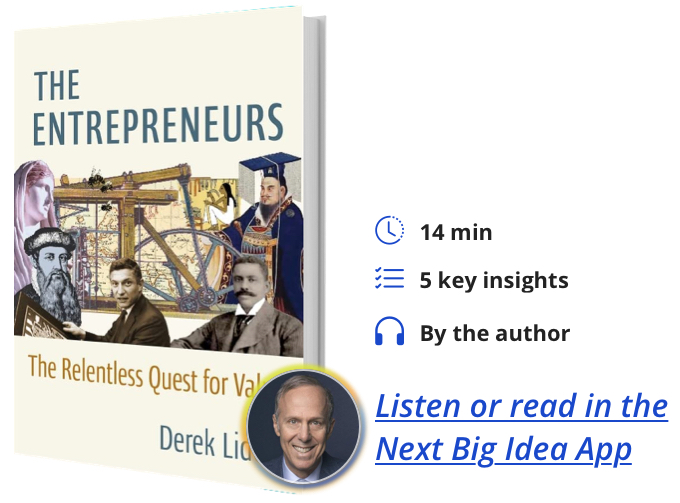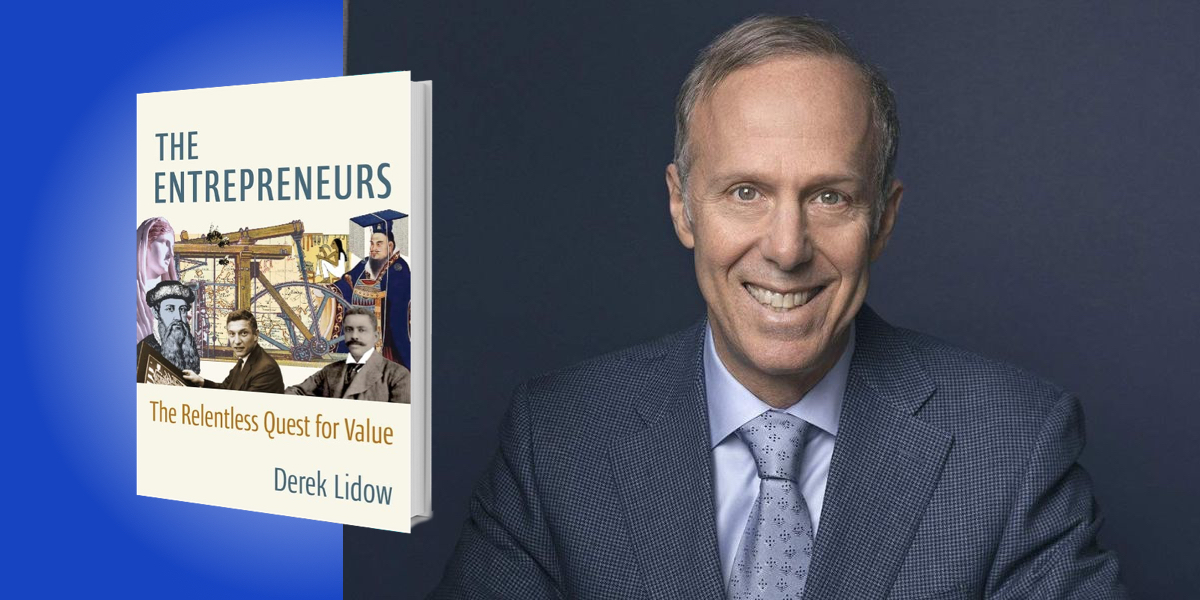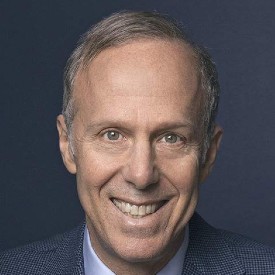Derek Lidow is a professor of entrepreneurship at Princeton University. This is his third book about entrepreneurs. He was also formerly CEO and founder of iSuppli, and former CEO of International Rectifier.
Below, Derek shares 5 key insights from his new book, The Entrepreneurs: The Relentless Quest for Value. Listen to the audio version—read by Derek himself—in the Next Big Idea App.

1. Entrepreneurs are the world’s greatest change agents.
Entrepreneurs have a bigger influence on our lives than governments, religions, or big business. If entrepreneurs didn’t exist we would live in a world without computers, smartphones, or streaming video. We wouldn’t have planes, trains, or automobiles. There would be no electricity, no medical devices. We almost wouldn’t have clothing.
But, without entrepreneurs it would also be a world without slavery and inequality. It would be a world without most cancers, diabetes, and workplace injuries. It would be a world without pollution, deforestation, and climate change.
You would be hard pressed to try finding things in your world not pioneered or made by an entrepreneur—and that is an amazing realization. Entrepreneurs impact our lives in ways that make our world both far better and, unfortunately, far worse.
2. Entrepreneurs behave as if they were a swarm.
It’s the collective behavior of entrepreneurs that gives their actions such a huge impact. It’s not just a few lucky entrepreneurs heroically acting alone.
Consider Josiah Wedgewood. He was as famous and successful in his time as Elon Musk and Jeff Bezos are today. We still recognize him as a major product design innovator more than 200 years after his death. He is the one who pioneered the modern shopping experience—Steve Jobs copied his store designs. Wedgewood built the first factory with in-line production and created the first brand, known as The Queen’s Ware. But he was not a lone innovative savant, as myth might have you think.
Wedgewood was born to a family of potters in an ancient town of potters. He worked for others before starting his own enterprise. His innovations were incremental, and most of them did not work. His success was more a reflection of being the most curious and hardworking potter than any singular ah-hah moment. Even more important: he copied others. He used versions of glazes that he saw selling well for his competitors. Of course, then other potters copied his version of the glaze, and back and forth the influence went.
“Innovations in a swarm are the result of entrepreneurs constantly watching one another.”
Whether it’s Wedgewood or modern-day entrepreneurs, innovations in a swarm are the result of entrepreneurs constantly watching one another. They copy what caused someone else to be successful, and then personalize what they copied. Bezos personalized how items get delivered. Wedgewood personalized how products got made. The swarm sees which personalization works and that then becomes the next thing to get copied—leading to more improvements.
In this way, the swarm of entrepreneurs produce innovations that constantly and rapidly expand in scale. Ultimately, these innovations make us want to change our lives to adopt them.
3. Almost all entrepreneurial innovation leads to unintended consequences.
The danger is that the unintended consequences of entrepreneurial innovation are often unacknowledged even though they can threaten the world’s existence.
Take for instance James Drax. He was one of the original 50 people who colonized Barbados. He became the world’s most successful sugar baron through his ability to scale up sugar production. He created unimaginable wealth for his time in the mid-1600s. But he also wreaked unimaginable damage. He didn’t buy slaves two or four at a time, like everyone else in the world back then. He bought entire boatloads. Copying what he did caused the transatlantic slave trade to explode. His methods of organizing labor and controlling production processes have been copied and improved upon ever since. Today, we do not realize the link these methods have to controlling slaves.
Besides having the highest concentration of slaves, Barbados became deforested. It became more expensive to live on Barbados than in London. Even if you weren’t a slave, you were destitute there unless you were a sugar baron or owned a business.
Entrepreneurs, by nature, leave a trail of unintended consequences as they focus on keeping up with others in their swarm. These unintended consequences accumulate and it is essential that we realize that.
4. Governments and rulers have always been ineffective at controlling the unintended consequences of entrepreneurial innovation.
Today, legislators around the world grapple with the unintended consequences caused by the entrepreneurial social media swarm. They debate laws to stem the loss of privacy, the spread of fake news, and the rise of online bullying. But nowhere have we seen very effective legislation.
“Governments enact rules, but there have always been entrepreneurs who go around them or ignore them.”
Entrepreneurial history tells us not to expect legislation until an angry population threatens a politician’s term or a ruler’s tenure. Then they enact rules long on bureaucracy and short on impact.
Cornelius Vanderbilt summed up the relationship of entrepreneurs with governments when he was called to testify in front of a committee of legislators. Vanderbilt had just forced dozens of women and children out of their train carriages to cross an icy bridge (in a blizzard) to show another entrepreneur that he was more powerful. He said, “The law goes too slow for me when I have the remedy in my own hands.” The legislators did nothing.
Governments enact rules, but there have always been entrepreneurs who go around them or ignore them. Most commercial laws have been written to contain entrepreneurial overreach. Even in Hammurabi’s code, history’s first documented set of laws, one-fourth pertain to entrepreneurs.
It is no different under autocrats—even ruthless ones. Rulers can take control of business if an entrepreneur seems threatening. But once started, swarms cannot be extinguished no matter if there is the threat of arrest or death. Each weekend, thousands of North Korean entrepreneurs offer forbidden products in open air pop-up markets. Yet, they are not arrested.
We have come to accept both the good and bad of what entrepreneurs bring to our world. We pay for the entrepreneurial innovations that cause global problems because governments do not understand how to prevent unintended entrepreneurial consequences and rule breaking.
We’re paying in both higher taxes and hidden costs. Homeowners and renters’ insurance costs have soared because insurance companies have had huge payouts for severe flooding aggravated by hydrocarbon emissions. We pay for the cost of type 2 diabetes and for people dying from lung cancer with higher health insurance costs and taxes. We pay taxes to clean beaches of plastics and to deal with the addicted. We pay to house families that have lost their homes because they defaulted on a loan.
Hidden costs are accelerating as governments have not protected us from the accumulating unintended consequences of entrepreneurial innovation.
5. We can take steps to lessen harms from entrepreneurial innovation.
Imagine a world where we knew what to expect from entrepreneurs. Wouldn’t we be savvier about the true benefits of entrepreneurial innovation? And wouldn’t we be wary of the hidden social taxes we would be forced to pay?
“Entrepreneurs (big and small) aspire to be recognized for their achievements even more than they aspire to increase profits.”
A little education would go a long way in understanding how much we’re being directed by entrepreneurs. For example, I recommend short teaching modules about how entrepreneurship shapes our lives, delivered in about 4th and 11th grade. That would help us, from a young age, better decide which products to buy and which have hidden costs.
Also, looking through the history of entrepreneurship, it becomes clear that entrepreneurs (big and small) aspire to be recognized for their achievements even more than they aspire to increase profits. And we should recognize them for how much they contribute to our enjoyment and productivity. So I propose the creation of a National Academy of Entrepreneurs. Membership would have a similar prestige to becoming a member of the National Academy of Sciences. Entrepreneurs behave in ways likely to get them elected as members. Similarly prestigious institutions could be enacted at city and state level.
To be recognized for their contributions, entrepreneurs should publicly post their own analysis of the potential adverse consequences of their products and services. They already do so privately if they have investors. Dishonest entrepreneurs would provoke consumer backlash.
Finally, we should expect entrepreneurs to pay the costs that the government and public bear to lessen the unintended consequences of their actions.
We can’t live without entrepreneurs, but we can choose to live in a better world because of entrepreneurs if we understand how they work and their impacts.
To listen to the audio version read by author Derek Lidow, download the Next Big Idea App today:
































